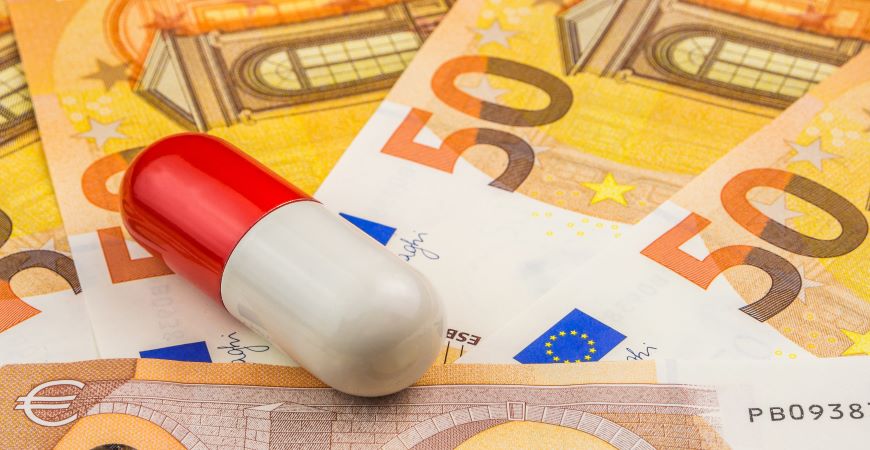This website uses cookies so that we can provide you with the best user experience possible. Cookie information is stored in your browser and performs functions such as recognising you when you return to our website and helping our team to understand which sections of the website you find most interesting and useful.
ALEXM result: Big Pharma company Leadiant fined over excessive pricing of essential drug

The Italian Competition Authority found that Leadiant had infringed Article 102 of the Treaty of the Functioning of the EU which prohibits dominant firms from abusing their position. The fine relates to the production of the lifesaving medication chenodeoxycholic acid Leadiant (CDCA-Leadiant).
This medication is used to treat patients with the very rare disease cerebrotendinous xanthotomatosis (CTX) which causes severe disability and shortens life expectancy. The medication alleviates symptoms and enable patients to live more comfortably, it needs to be taken every day throughout the person’s life.
The authority found that Leadiant had been charging the Italian health service excessively high and unfair prices for the drug since 2017. The drug was not available anywhere else in Europe and with patients needing ongoing treatment, the public health service had little choice but to pay the exorbitant price tag.
Eye watering prices for vital medication
To put the excessive nature of the pricing into context, it’s worth understanding a little more about what goes into this medication. The active ingredient in the drug chenodeoxycholic acid (CDCA) is not new or innovative – CDCA-based drugs have been on the market since the 1970s for the treatment of gallstones. In that time, its effectiveness in treating XTC was discovered. Although it was not formally authorized and remained as ‘off label usage’, it became an essential, safe and the only effective treatment for XTC.
It was also very cheap – in the 1990s a daily dosage would cost around €1, making the yearly treatment bill only €365. In 2008, Leadiant purchased the gallstone treatment drug and entered into an exclusive supply agreement with the core supplier of CDCA in Europe, giving them sole control of it.
Through a complex strategy of buying and withdrawing products containing CDCA, preparatory price rises and artificially re-launching the medication under new names, Leadiant was in pole position to be the sole manufacturer and supplier of the drug. When it came to be formally authorized as a pharmacological treatment for XTC, the company took the opportunity to raise the price to an eye watering €15,000 per monthly pack. This was despite not investing any costs or risks in the development of the treatment.
ALEXM project helped show Leadiant breached competition law
When proceedings against them began in 2019, initiated by a report from Altroconsumo, the company did lower its price but the investigation found that it was still unfairly high. Euroconsumers and its members are especially pleased with this result. ALEXM – which stands for Anti-trust Law Enforcement for Medicines and is supported by the Open Society Foundations – was set up in 2018 in response to dramatic price rises in medicine in the EU. Through the ALEXM project Test Achats/Test Aankoop and Altroconsumo have been making the case for using antitrust law to analyse and file complaints against such exploitative big pharma practices.
The actions that Leadiant took were in breach of competition law in Italy and resulted in harm not just to the individuals needing treatment, but the national health system which was forced to use public health resources to pay above the odds.
Will other national authorities follow suit?
Other national regulators have found against Leadiant on the same issue. In July 2021, after a complaint from the Pharmaceutical Accountability Foundation to the competition authority in the Netherlands, the company was fined €19.5m for abusing its dominant position by charging an excessive price for CDCA-Leadiant from 2017-2019. As with Italy, the size of the fine reflects the seriousness of the violation which saw a huge price increase implemented by Leadiant after a small low-risk investment and no additional innovation. The Dutch authority explained that while higher price could be justified if the manufacturer sought to recoup high costs, or if the product offers many benefits or is innovative, neither of these was the case with CDCA-Leadiant.
We are now waiting to see how other national authorities will respond. Test Achats filed a complaint with the Competition Authority in 2019 and hopes to obtain a similar conviction in Belgium. OCU, Euroconsumers’ Spanish member has also filed a complaint in Spain.
Both Altroconsumo and Test Achats are prioritizing the monitoring of pharmaceutical companies, reporting anomalies and misconduct and raising public awareness on these big pharma practices.
Pursuing companies under antitrust legislation, particularly on the issue of excessively priced treatments for rare conditions which are constantly being negotiated with national authorities, is seeing success and as judgements come in from across Europe, we hope that big pharma will end this exploitative practice of profits over people’s health.


